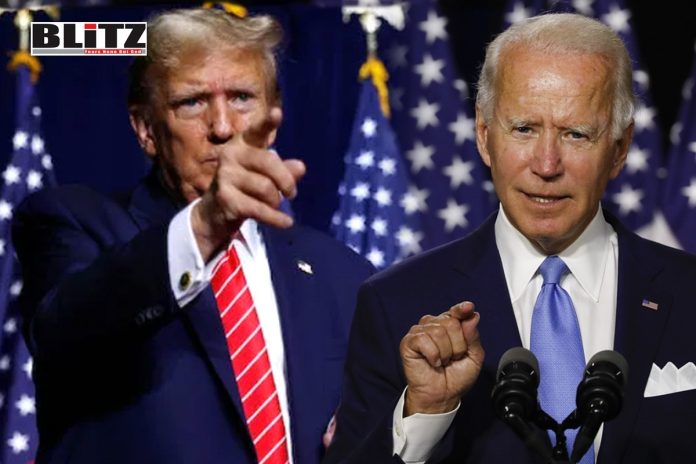In the labyrinthine landscape of American politics, even the most seasoned contenders can stumble upon unforeseen obstacles. Recent developments have cast a revealing spotlight on the ebb and flow of political fortunes, providing valuable insights for the impending clash between President Joe Biden and his potential rival, former President Donald Trump. While these setbacks may appear minor in the grand scheme of the presidential race, they serve as pivotal waypoints in deciphering the intricate dynamics of the electoral journey.
President Biden, despite his formidable incumbency, experienced a startling setback on March 5 during the Democratic party’s caucus in American Samoa. The unexpected victory of a relatively obscure figure, Jason Palmer, resonated far beyond the shores of the Pacific, signaling a burgeoning demand for leadership that embodies the spirit of the 21st century. Biden’s advanced age, at 81, has remained a persistent specter looming over his candidacy, igniting debates about his capacity to navigate the complex challenges of modern governance.
American Samoa, though diminutive in size and population, wielded significant influence as it allocated delegates to the Democratic National Convention. Palmer’s triumph, coupled with the vibrant presence of territories like American Samoa and the Virgin Islands at party conventions, underscores the rich tapestry of diversity within the Democratic Party. Nevertheless, it also serves as a poignant reminder of the limitations faced by territories, which lack representation in the electoral college, relegating their impact to the confines of intra-party politics.
On Super Tuesday, Donald Trump faced a significant setback within the Republican Party as he suffered defeat in the Vermont primary to Nikki Haley, an Indian-American contender. Vermont, known for its progressive values and dedication to public trust, proved receptive to Haley’s message of inclusive conservatism. Her unexpected triumph in Vermont, coupled with her prior success in the District of Columbia, underscores the divisions within the Republican Party. Haley’s victory signals a growing appetite for alternative voices within conservative circles, suggesting a shift in the ideological landscape. This outcome highlights the complexities and evolving dynamics within the GOP, as traditional boundaries are challenged and new perspectives gain traction.
These defeats carry profound significance beyond mere symbolism, heralding the emergence of shifting political currents that could profoundly impact the November election. Vermont’s progressive stronghold, epitomized by leaders such as Bernie Sanders and Governor Phil Scott, mirrors a rising desire for political pluralism and alternatives to the entrenched two-party paradigm. The outcomes on Super Tuesday offer a glimpse into an evolving landscape where traditional allegiances are questioned, paving the way for potential transformations in the broader political arena.
Furthermore, insights gleaned from states like New Hampshire offer valuable perspectives on crucial voter trends that could sway the national outcome. Haley’s strong showing among independents and affluent households, juxtaposed with Trump’s struggles to expand his support base beyond his core constituency, paints a nuanced picture of electoral dynamics. As swing states emerge as pivotal battlegrounds, the ability to appeal to undecided voters and conservative Democrats becomes imperative for both candidates.
Abortion emerges as a prominent issue on the electoral horizon, particularly in New Hampshire, where it ranks among the top concerns for voters. Donald Trump’s lukewarm support among abortion-rights advocates presents a significant hurdle in garnering broader support. In contrast, Joe Biden’s steadfast position on the issue offers him a potential advantage, strengthening his appeal among key demographic groups. However, the political terrain remains dynamic, with evolving concerns such as the Israeli-Palestinian conflict looming large, poised to reshape electoral dynamics in critical states. As the election unfolds, the significance of these issues and candidates’ stances on them will continue to shape voter sentiment and political strategies.
Trump’s steadfast support for Israel, traditionally aligned with Republican priorities, carries the risk of alienating segments of the Democratic base disillusioned by the recent conflict in Gaza. States like Michigan and Minnesota, with significant Palestinian and Arab-American populations, could tilt against Biden if peace efforts falter. These geopolitical fault lines add another layer of complexity to an already volatile electoral terrain.
With the race heating up, attention pivots towards pivotal swing states where the fate of the presidency teeters on a knife’s edge. Predictably, traditional Democratic bastions such as California and New York are poised to stay firmly in the blue column. However, it’s the battlegrounds of states like Texas that hold the decisive sway in determining the ultimate victor. As presumptive candidates solidify their positions, the remaining primaries serve more as procedural rituals, unlikely to yield significant surprises or alter the overarching narrative of the race.
In this high-stakes showdown, each setback and triumph holds profound significance, molding the narrative and course of the presidential race. The insights drawn from Biden and Trump’s minor defeats serve as poignant reminders of the unpredictable nature inherent in American politics. As the nation hurtles towards an unprecedented election, amidst the swirling uncertainty, one certainty emerges: the path ahead is destined to be as tumultuous as it is transformative. With every twist and turn, the American electorate braces itself for a journey fraught with challenges yet ripe with the potential for profound change.




